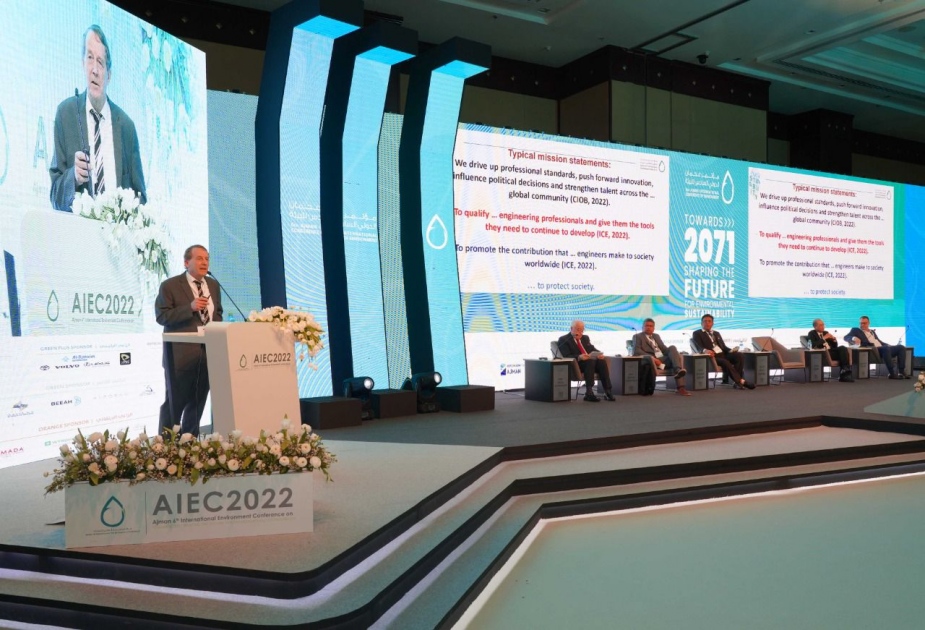
Ajman 6th International Environment Conference discusses shaping the future of sustainable cities and communities
Under the patronage of His Highness Sheikh Humaid bin Rashid Al Nuaimi, member of the UAE Supreme Council, and Ruler of the Emirate of Ajman, and His Highness Sheikh Ammar Bin Humaid Al Nuaimi, Crown Prince, inaugurated yesterday Ajman 6th International Environment Conference, in the presence of Sheikh Rashid bin Humaid Al Nuaimi, the chairman of Ajman Municipality and Planning Department, and H.E. Shaukat Aziz, former Prime Minister of Pakistan, with the participation of a group of experts, specialists and academics from leading institutions in the field of sustainability and comprehensive development.
The two-day conference, discussed many environmental issues and the importance of taking environmentally friendly behavioral measures, in line with the directions of the country's centennial 2021 to build A more sustainable future for present and future generations.
The opening session began with a speech by Engineer Aisha Al Abdooli from the Ministry of Climate Change and Environment, who emphasized that the repercussions of climate change that the world is witnessing, including natural disasters and rising global temperatures, which affect the lives of millions of people around the world, is the most important challenge now, which requires concerted efforts in different sectors to reduce the impact of these repercussions.
Al-Abdooli added, the ability to confront climate change is linked to working to reduce its main causes, namely the high rate of greenhouse gases and the excessive consumption of environmental resources, increasing reliance on clean and renewable energy sources, and raising global public awareness of the nature of climate change and the requirements to adapt to its repercussions.
She stressed that thanks to the directives of the wise leadership of the United Arab Emirates, the past years have witnessed more positive transformations in the field of facing the challenge of climate change, the most important of which is the launch of the Emirates Energy Strategy, the National Plan for Climate Change, and the National Program for Adaptation to Climate Change, which in total represent a road map A long-term national and an important starting point in our march towards the UAE centenary, and in our endeavors to respond to the challenges of climate change and turn them into opportunities.
His Excellency Shaukat Aziz, the former Prime Minister of Pakistan, praised the UAE's experience and its outstanding efforts at the regional and global levels in supporting environmental efforts to maintain the sustainability of its natural resources and reduce the repercussions of climate change, and ways to benefit from the UAE's pioneering experience in achieving the sustainability of its resources in this field.
Humaid Bin Rashid International Award for Sustainability
On the sidelines of the conference, the Municipality and Planning Department announced the names of the winners of Humaid Bin Rashid International Award for Sustainability in its first edition, and the winner in the first category, which aims to honor environmental personalities with an impact in the field of environmental protection, His Excellency Dawood Al Hajri, Director General of Dubai Municipality, and the winners in the second category. The award for the best research on sustainable cities includes Dr. Mohammed Al 'Esawy from Tanta University in Cairo, second place is Dr. Mona Salama and Ahmad M. Odeh from Ajman University, and third place is Zamzam Ali Al-Rashidi and Anita Kumar from the Environment Agency in Abu Dhabi.
As for the winners in the third category, which includes the best institution that adopts best practices to protect the environment, Al Ain City Municipality won first place, Dubai Municipality ranked second, and Sharjah Electricity and Water Authority won third place.
Shaping the future of sustainable cities and communities
On its first day, the conference witnessed several sessions, and the first session, which was moderated by Professor Riadh Al-Dabbagh, touched on topics related to the future and sustainability in cities and communities. Prof. Mukesh Limbachiya participated in this session, and the title of his paper was Shaping Cities for Sustainability and Population Well-being, and Professor Manish Kumar, who touched upon the actual sustainability analysis of water use patterns, and Professor Peter Farrell, spoke about the professionalization of the engineering workforce to meet the challenges of climate change and reach the minimum carbon emissions, and Chris Wan, who touched on shaping the future of sustainable cities, and Professor Anthony Okoh, Where he touched on emerging challenges in the water sector and their implications on public health.
Environmental prospects for the fourth industrial revolution
The second session, chaired by Professor Mufid Samarai, addressed many important topics, including the topic of the environmental prospects of the Fourth Industrial Revolution, in which Professor Wolfram Hardt spoke, and he touched on the applications of artificial intelligence for smart cities and the role of autonomous drones, and discussed ways to implement smart digital solutions based on informatics. technology, as well as searching for solutions to make factories more automated, integrating business requirements, smart buildings and other fields, and discovering software, devices, tools and other resources for artificial intelligence to help societies meet the requirements of the future for progress and well-being.
For his part, Haysam Salah ElDin discussed in his paper the study of the bending of reinforced concrete beams that are self-repairing using smart alloys in many strengthening techniques, while Arash Nejatian’s paper dealt with the topic of direct current technology and alternative current that revolutionizes ecological agriculture in desert ecosystems, and Nawal Youssef Alhanaey addressed Hydrogen's pioneering roadmap towards achieving strategic climate initiatives 2050.



























